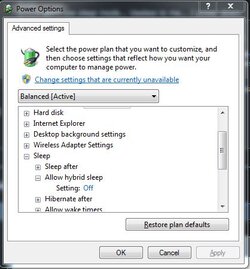- Joined
- Dec 31, 2004
- Location
- Osan AB, South Korea
I've been dealing with this for a while now, but this happened to me again last night and I lost a few hours of work in Premiere and I'm pissed about it, so I'm finally getting around to trying to fix this. 
Occasionally, my computer appears to freeze up right before it goes to sleep. I don't know any other way to describe it. I click Sleep, and it goes through the normal process for about a second: the GPU turns off (as evidenced by the fact that my monitor thinks it's not connected to anything), the USB ports turn off (as evidenced by my keyboard not lighting up), everything appears normal...but the fans just keep running, and the power LED stays on. It then doesn't respond to any input from the keyboard/mouse, doesn't do anything if I plug in a USB hard drive, etc. The only thing I can do is hold down the power button until it turns off, then reboot.
Any ideas where I can start troubleshooting this?
Looking in the Event Viewer, there's nothing significant from last night when I got this freeze. There are 3 simultaneous "Information" entries, which I copied below.
Log Name: Microsoft-Windows-Diagnosis-DPS/Operational
Source: Microsoft-Windows-Diagnosis-DPS
Date: 3/30/2014 11:17:28 PM
Event ID: 110
Task Category: Scenario Lifecycle
Level: Information
Keywords: Scenario lifecycle events
User: LOCAL SERVICE
Computer: [NAME]-Desktop
Description:
Diagnostic module {282396B2-6C46-4D66-B413-70B0445DF33C} (%SystemRoot%\system32\diagperf.dll) finished troubleshooting scenario {186F47EF-626C-4670-800A-4A30756BABAD}, instance {4F485030-9002-4810-8E39-96783C357B61}, original activity ID {00000000-0000-0000-0000-000000000000}. No resolution was set by the diagnostic module.
Event Xml:
<Event xmlns="http://schemas.microsoft.com/win/2004/08/events/event">
<System>
<Provider Name="Microsoft-Windows-Diagnosis-DPS" Guid="{6BBA3851-2C7E-4DEA-8F54-31E5AFD029E3}" />
<EventID>110</EventID>
<Version>0</Version>
<Level>4</Level>
<Task>1</Task>
<Opcode>14</Opcode>
<Keywords>0x4000000800000000</Keywords>
<TimeCreated SystemTime="2014-03-31T04:17:28.189596000Z" />
<EventRecordID>13335</EventRecordID>
<Correlation ActivityID="{4F485030-9002-4810-8E39-96783C357B61}" />
<Execution ProcessID="1860" ThreadID="8760" />
<Channel>Microsoft-Windows-Diagnosis-DPS/Operational</Channel>
<Computer>[NAME]-Desktop</Computer>
<Security UserID="S-1-5-19" />
</System>
<EventData>
<Data Name="ScenarioId">{186F47EF-626C-4670-800A-4A30756BABAD}</Data>
<Data Name="InstanceId">{4F485030-9002-4810-8E39-96783C357B61}</Data>
<Data Name="OriginalActivityId">{00000000-0000-0000-0000-000000000000}</Data>
<Data Name="DiagnosticModuleImageName">%SystemRoot%\system32\diagperf.dll</Data>
<Data Name="DiagnosticModuleId">{282396B2-6C46-4D66-B413-70B0445DF33C}</Data>
</EventData>
</Event>
Log Name: Microsoft-Windows-Diagnosis-DPS/Operational
Source: Microsoft-Windows-Diagnosis-DPS
Date: 3/30/2014 11:17:28 PM
Event ID: 105
Task Category: Scenario Lifecycle
Level: Information
Keywords: Scenario lifecycle events
User: LOCAL SERVICE
Computer: [NAME]-Desktop
Description:
Diagnostic module {282396B2-6C46-4D66-B413-70B0445DF33C} (%SystemRoot%\system32\diagperf.dll) started troubleshooting scenario {186F47EF-626C-4670-800A-4A30756BABAD}, instance {4F485030-9002-4810-8E39-96783C357B61}, original activity ID {00000000-0000-0000-0000-000000000000}.
Event Xml:
<Event xmlns="http://schemas.microsoft.com/win/2004/08/events/event">
<System>
<Provider Name="Microsoft-Windows-Diagnosis-DPS" Guid="{6BBA3851-2C7E-4DEA-8F54-31E5AFD029E3}" />
<EventID>105</EventID>
<Version>0</Version>
<Level>4</Level>
<Task>1</Task>
<Opcode>13</Opcode>
<Keywords>0x4000000800000000</Keywords>
<TimeCreated SystemTime="2014-03-31T04:17:28.188596000Z" />
<EventRecordID>13334</EventRecordID>
<Correlation ActivityID="{4F485030-9002-4810-8E39-96783C357B61}" />
<Execution ProcessID="1860" ThreadID="8760" />
<Channel>Microsoft-Windows-Diagnosis-DPS/Operational</Channel>
<Computer>[NAME]-Desktop</Computer>
<Security UserID="S-1-5-19" />
</System>
<EventData>
<Data Name="ScenarioId">{186F47EF-626C-4670-800A-4A30756BABAD}</Data>
<Data Name="InstanceId">{4F485030-9002-4810-8E39-96783C357B61}</Data>
<Data Name="OriginalActivityId">{00000000-0000-0000-0000-000000000000}</Data>
<Data Name="DiagnosticModuleImageName">%SystemRoot%\system32\diagperf.dll</Data>
<Data Name="DiagnosticModuleId">{282396B2-6C46-4D66-B413-70B0445DF33C}</Data>
</EventData>
</Event>
Log Name: Microsoft-Windows-Diagnosis-DPS/Operational
Source: Microsoft-Windows-Diagnosis-DPS
Date: 3/30/2014 11:17:28 PM
Event ID: 100
Task Category: Scenario Lifecycle
Level: Information
Keywords: Scenario lifecycle events
User: LOCAL SERVICE
Computer: [NAME]-Desktop
Description:
Diagnostic module {282396B2-6C46-4D66-B413-70B0445DF33C} (%SystemRoot%\system32\diagperf.dll) detected a problem for scenario {186F47EF-626C-4670-800A-4A30756BABAD}, instance {4F485030-9002-4810-8E39-96783C357B61}, original activity ID {00000000-0000-0000-0000-000000000000}.
Event Xml:
<Event xmlns="http://schemas.microsoft.com/win/2004/08/events/event">
<System>
<Provider Name="Microsoft-Windows-Diagnosis-DPS" Guid="{6BBA3851-2C7E-4DEA-8F54-31E5AFD029E3}" />
<EventID>100</EventID>
<Version>0</Version>
<Level>4</Level>
<Task>1</Task>
<Opcode>12</Opcode>
<Keywords>0x4000000800000000</Keywords>
<TimeCreated SystemTime="2014-03-31T04:17:28.188596000Z" />
<EventRecordID>13333</EventRecordID>
<Correlation ActivityID="{4F485030-9002-4810-8E39-96783C357B61}" />
<Execution ProcessID="1860" ThreadID="8760" />
<Channel>Microsoft-Windows-Diagnosis-DPS/Operational</Channel>
<Computer>[NAME]-Desktop</Computer>
<Security UserID="S-1-5-19" />
</System>
<EventData>
<Data Name="ScenarioId">{186F47EF-626C-4670-800A-4A30756BABAD}</Data>
<Data Name="InstanceId">{4F485030-9002-4810-8E39-96783C357B61}</Data>
<Data Name="OriginalActivityId">{00000000-0000-0000-0000-000000000000}</Data>
<Data Name="DiagnosticModuleImageName">%SystemRoot%\system32\diagperf.dll</Data>
<Data Name="DiagnosticModuleId">{282396B2-6C46-4D66-B413-70B0445DF33C}</Data>
</EventData>
</Event>

Occasionally, my computer appears to freeze up right before it goes to sleep. I don't know any other way to describe it. I click Sleep, and it goes through the normal process for about a second: the GPU turns off (as evidenced by the fact that my monitor thinks it's not connected to anything), the USB ports turn off (as evidenced by my keyboard not lighting up), everything appears normal...but the fans just keep running, and the power LED stays on. It then doesn't respond to any input from the keyboard/mouse, doesn't do anything if I plug in a USB hard drive, etc. The only thing I can do is hold down the power button until it turns off, then reboot.
Any ideas where I can start troubleshooting this?
Looking in the Event Viewer, there's nothing significant from last night when I got this freeze. There are 3 simultaneous "Information" entries, which I copied below.
Log Name: Microsoft-Windows-Diagnosis-DPS/Operational
Source: Microsoft-Windows-Diagnosis-DPS
Date: 3/30/2014 11:17:28 PM
Event ID: 110
Task Category: Scenario Lifecycle
Level: Information
Keywords: Scenario lifecycle events
User: LOCAL SERVICE
Computer: [NAME]-Desktop
Description:
Diagnostic module {282396B2-6C46-4D66-B413-70B0445DF33C} (%SystemRoot%\system32\diagperf.dll) finished troubleshooting scenario {186F47EF-626C-4670-800A-4A30756BABAD}, instance {4F485030-9002-4810-8E39-96783C357B61}, original activity ID {00000000-0000-0000-0000-000000000000}. No resolution was set by the diagnostic module.
Event Xml:
<Event xmlns="http://schemas.microsoft.com/win/2004/08/events/event">
<System>
<Provider Name="Microsoft-Windows-Diagnosis-DPS" Guid="{6BBA3851-2C7E-4DEA-8F54-31E5AFD029E3}" />
<EventID>110</EventID>
<Version>0</Version>
<Level>4</Level>
<Task>1</Task>
<Opcode>14</Opcode>
<Keywords>0x4000000800000000</Keywords>
<TimeCreated SystemTime="2014-03-31T04:17:28.189596000Z" />
<EventRecordID>13335</EventRecordID>
<Correlation ActivityID="{4F485030-9002-4810-8E39-96783C357B61}" />
<Execution ProcessID="1860" ThreadID="8760" />
<Channel>Microsoft-Windows-Diagnosis-DPS/Operational</Channel>
<Computer>[NAME]-Desktop</Computer>
<Security UserID="S-1-5-19" />
</System>
<EventData>
<Data Name="ScenarioId">{186F47EF-626C-4670-800A-4A30756BABAD}</Data>
<Data Name="InstanceId">{4F485030-9002-4810-8E39-96783C357B61}</Data>
<Data Name="OriginalActivityId">{00000000-0000-0000-0000-000000000000}</Data>
<Data Name="DiagnosticModuleImageName">%SystemRoot%\system32\diagperf.dll</Data>
<Data Name="DiagnosticModuleId">{282396B2-6C46-4D66-B413-70B0445DF33C}</Data>
</EventData>
</Event>
Log Name: Microsoft-Windows-Diagnosis-DPS/Operational
Source: Microsoft-Windows-Diagnosis-DPS
Date: 3/30/2014 11:17:28 PM
Event ID: 105
Task Category: Scenario Lifecycle
Level: Information
Keywords: Scenario lifecycle events
User: LOCAL SERVICE
Computer: [NAME]-Desktop
Description:
Diagnostic module {282396B2-6C46-4D66-B413-70B0445DF33C} (%SystemRoot%\system32\diagperf.dll) started troubleshooting scenario {186F47EF-626C-4670-800A-4A30756BABAD}, instance {4F485030-9002-4810-8E39-96783C357B61}, original activity ID {00000000-0000-0000-0000-000000000000}.
Event Xml:
<Event xmlns="http://schemas.microsoft.com/win/2004/08/events/event">
<System>
<Provider Name="Microsoft-Windows-Diagnosis-DPS" Guid="{6BBA3851-2C7E-4DEA-8F54-31E5AFD029E3}" />
<EventID>105</EventID>
<Version>0</Version>
<Level>4</Level>
<Task>1</Task>
<Opcode>13</Opcode>
<Keywords>0x4000000800000000</Keywords>
<TimeCreated SystemTime="2014-03-31T04:17:28.188596000Z" />
<EventRecordID>13334</EventRecordID>
<Correlation ActivityID="{4F485030-9002-4810-8E39-96783C357B61}" />
<Execution ProcessID="1860" ThreadID="8760" />
<Channel>Microsoft-Windows-Diagnosis-DPS/Operational</Channel>
<Computer>[NAME]-Desktop</Computer>
<Security UserID="S-1-5-19" />
</System>
<EventData>
<Data Name="ScenarioId">{186F47EF-626C-4670-800A-4A30756BABAD}</Data>
<Data Name="InstanceId">{4F485030-9002-4810-8E39-96783C357B61}</Data>
<Data Name="OriginalActivityId">{00000000-0000-0000-0000-000000000000}</Data>
<Data Name="DiagnosticModuleImageName">%SystemRoot%\system32\diagperf.dll</Data>
<Data Name="DiagnosticModuleId">{282396B2-6C46-4D66-B413-70B0445DF33C}</Data>
</EventData>
</Event>
Log Name: Microsoft-Windows-Diagnosis-DPS/Operational
Source: Microsoft-Windows-Diagnosis-DPS
Date: 3/30/2014 11:17:28 PM
Event ID: 100
Task Category: Scenario Lifecycle
Level: Information
Keywords: Scenario lifecycle events
User: LOCAL SERVICE
Computer: [NAME]-Desktop
Description:
Diagnostic module {282396B2-6C46-4D66-B413-70B0445DF33C} (%SystemRoot%\system32\diagperf.dll) detected a problem for scenario {186F47EF-626C-4670-800A-4A30756BABAD}, instance {4F485030-9002-4810-8E39-96783C357B61}, original activity ID {00000000-0000-0000-0000-000000000000}.
Event Xml:
<Event xmlns="http://schemas.microsoft.com/win/2004/08/events/event">
<System>
<Provider Name="Microsoft-Windows-Diagnosis-DPS" Guid="{6BBA3851-2C7E-4DEA-8F54-31E5AFD029E3}" />
<EventID>100</EventID>
<Version>0</Version>
<Level>4</Level>
<Task>1</Task>
<Opcode>12</Opcode>
<Keywords>0x4000000800000000</Keywords>
<TimeCreated SystemTime="2014-03-31T04:17:28.188596000Z" />
<EventRecordID>13333</EventRecordID>
<Correlation ActivityID="{4F485030-9002-4810-8E39-96783C357B61}" />
<Execution ProcessID="1860" ThreadID="8760" />
<Channel>Microsoft-Windows-Diagnosis-DPS/Operational</Channel>
<Computer>[NAME]-Desktop</Computer>
<Security UserID="S-1-5-19" />
</System>
<EventData>
<Data Name="ScenarioId">{186F47EF-626C-4670-800A-4A30756BABAD}</Data>
<Data Name="InstanceId">{4F485030-9002-4810-8E39-96783C357B61}</Data>
<Data Name="OriginalActivityId">{00000000-0000-0000-0000-000000000000}</Data>
<Data Name="DiagnosticModuleImageName">%SystemRoot%\system32\diagperf.dll</Data>
<Data Name="DiagnosticModuleId">{282396B2-6C46-4D66-B413-70B0445DF33C}</Data>
</EventData>
</Event>
Last edited:
